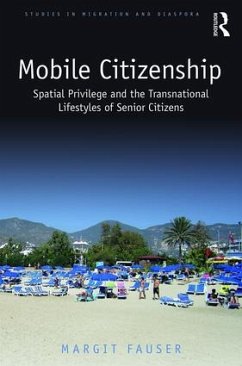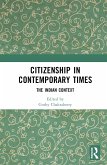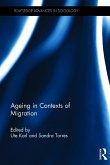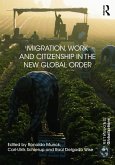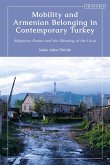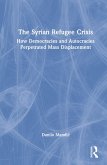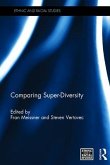Mobile Citizenship addresses the question of how mobility reconfigures citizenship, offering a novel perspective through the case of lifestyle émigrés, in particular retirees, moving south, from Germany to Turkey.
Hinweis: Dieser Artikel kann nur an eine deutsche Lieferadresse ausgeliefert werden.
Hinweis: Dieser Artikel kann nur an eine deutsche Lieferadresse ausgeliefert werden.
"People's increasing spatial mobility across national borders raises questions about citizenship as an institution anchored in a singular, territorialized, national jurisdiction. Fauser's Mobile Citizenship makes a significant, nuanced contribution to scholarly debates on this topic. Through her detailed study of German retirement-lifestyle migrants in Turkey, Fauser carefully analyzes how the interaction of citizenship status, rights, practices, and affective belonging in different localities engenders and reinforces social inequalities transnationally. She argues that rights and access to resources are embedded in an unequal global citizenship hierarchy. At the top of this hierarchy is the citizenship of affluent countries from the global north. While abroad, northern citizens, regardless of their class position at home, are imbued with and empowered by the privileges associated with their national states of origin. Mobile Citizenship convincingly shows how the spatial privilege of migrants from the global north who reside in the global south is transforming bounded understandings of citizenship. Citizenship can no longer be seen as belonging to a singular, territorialized national state. Instead, it has become an institution that is portable, mobile, and multiple. Fauser argues against received Marshallian conceptions, exploring how contemporary transnational citizenship helps reproduce local, national, and global inequalities. This book should be mandatory reading for graduate students, as well as established scholars interested in the study of citizenship, its future, and its theoretical and practical implications in a transnational context." - Luis Eduardo Guarnizo, University of California, Davis, USA
"Among several other works, Margit Fauser's book is the most comprehensive work that is concerned with the emigration of German retirees and their transnational lifestyles in Alanya, a Mediterranean city in the eastern part of the Turkish riviera. Driving from the notion of 'mobile citizenship', Fauser adds 'spatial rights' to the conventional layers of rights of citizenship such as civil, political and social rights. Based on a long period of fieldwork, her book explores the condition of contemporary 'mobile citizenship' as well as the changing configurations of citizenship resulting from spatial mobility. This book also offers a great insight about the life style migration practices of German retirees who have reversed classical migration routes in terms of purpose and direction. I would like to welcome this book for many of its qualities, among many others, especially for its successful portrayal of the ways in which active and reflexive German retirees enact mobile citizenship by means of unequal power geographies and resources." - Ayhan Kaya, Istanbul Bilgi University, Turkey
"Among several other works, Margit Fauser's book is the most comprehensive work that is concerned with the emigration of German retirees and their transnational lifestyles in Alanya, a Mediterranean city in the eastern part of the Turkish riviera. Driving from the notion of 'mobile citizenship', Fauser adds 'spatial rights' to the conventional layers of rights of citizenship such as civil, political and social rights. Based on a long period of fieldwork, her book explores the condition of contemporary 'mobile citizenship' as well as the changing configurations of citizenship resulting from spatial mobility. This book also offers a great insight about the life style migration practices of German retirees who have reversed classical migration routes in terms of purpose and direction. I would like to welcome this book for many of its qualities, among many others, especially for its successful portrayal of the ways in which active and reflexive German retirees enact mobile citizenship by means of unequal power geographies and resources." - Ayhan Kaya, Istanbul Bilgi University, Turkey

